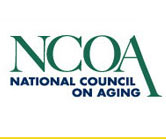NCOA’s Public Policy Update
April 6, 2007
Issue #7
In this Issue…
1. Older Americans Act Funding Campaign
2. Bipartisan Elder Justice Act introduced in the House and Senate
3. LTC Direct Care Worker Bill Introduced
4. Long-Term Care Links
1. Older Americans Act Funding Campaign
NCOA’s campaign to urge Congress to increase funding for Older Americans Act programs by 10 percent – titled “SUPPORT OUR SENIORS: Increase Funding for Food, Jobs & Care” – is moving along well. Recent accomplishments include:
• More than 1,100 e-mails were sent to members of Congress in March through the NCOA website, urging a 10 percent increase in the OAA appropriations;
• Several Senators and Representatives have submitted official requests to their respective Appropriations Committees for a 10 percent increase for FY08; and
• NCOA staff members have been working with advocates in key states/districts across the country to build additional grassroots support for the campaign.
We can still use your help. Here’s how to join in sending a message to Congress:
• If you have not e-mailed your three members of Congress, asking them to work for the 10 percent increase, please do it now by clicking here;
• If you have already sent your e-mails, send a new one this month, asking your members of Congress to write to their Appropriations Committee on behalf of the 10 percent increase;
• Visit NCOA’s website frequently to view the Advocacy Toolkit materials (including issue briefs and sample letters), and print them out for distribution to colleagues and friends;
• Tell your friends about NCOA’s campaign and encourage them to join NCOA’s Aging Advocacy Network; and
• If you have a story of a senior who was helped to stay healthy and independent by OAA-funded programs, go to our website and send it to us, so that we can use it in our advocacy.
2. Bipartisan Elder Justice Act introduced in the House and Senate
Sens. Orrin Hatch (R-UT) and Blanche Lincoln (D-AR), and Reps. Rahm Emanuel (D-IL) and Peter King (R-NY), introduced the Elder Justice Act on March 29th (S. 1070 and H.R. 1783). NCOA is a Coordinating Committee member of the Elder Justice Coalition, a bipartisan, 525 member group which supports both bills.
The bills would:
? Establish an Elder Justice Coordinating Council chaired by the Secretary of Health and Human Services and the U.S. Attorney General and would include the head of every federal agency that is involved with elder abuse, neglect and exploitation.
? Establish an Advisory Board to the Coordinating Council that would have 27 private citizen members who are experts and advocates on the issues surrounding elder abuse, neglect and exploitation.
? Award grants to establish and operate both stationary and mobile forensic centers and to develop forensic expertise pertaining to elder abuse, neglect and exploitation.
? Provide a federal funding source for Adult Protective Services (APS) programs. Up to this point, there has not been dedicated federal money to support APS programs.
? Require the Secretary of Health and Human Services to carry out activities that provide incentives for individuals to train for, seek and maintain employment in long-term care facilities and provides funding through 2011 to support these activities.
? Address LTC staffing problems by establishing incentive grants to attract qualified staff, retain staff, training staff and management.
? Require all adjudications of criminal violations by nursing facilities or employees to be reported, as well as consumer rights information, on the official Nursing Home Compare Website.
? Improve the training of surveyors with respect to investing allegations of abuse, neglect and misappropriation of property in programs and long-term care facilities that receive payments under Medicare and/or Medicaid.
To learn more about elder abuse, neglect and exploitation, visit the National Center on Elder Abuse.
3. LTC Direct Care Worker Bill Introduced
Rep. Lois Capps (D-CA) recently introduced H.R. 1279, the Direct Support Professionals Fairness and Security Act. The bill would amend Medicaid to provide funds to states to enable them to increase wages paid to direct care workers in long-term care. The goal would be to gradually increase the wages of direct care workers not employed by a state or local government so that it is equal to the wages paid to direct care workers who are employed by the state or local government. NCOA is analyzing the bill to determine whether to support it.
4. Long-Term Care Links
? The 7th CMS New Freedom Initiative Conference was held March 5-7 in Baltimore. Presentations are available. “Choice and Independence” is a key pillar of the Center for Medicare & Medicare Service’s vision for a person-centered long term services and supports system for the future. The 2007 conference focused on the policies, programs, and tools -including opportunities authorized by the Deficit Reduction Act– available to shape and carry out the vision.
? Long term care systems change should be responsive to customer choice and the need for community-based supports. A critical part of increasing choice is allowing persons in nursing facilities to decide whether they wish to remain where they are or move to a home of their own in their community of choice. Michigan's Nursing Facility Transition Initiative (NFTI) is about choosing to live in the community. The NFTI Project has created a training curriculum to help persons in transition, their families, and their support networks effectively and safely enable relocation to the community of their choice. The curriculum has six training modules. The Training contains an enormous amount of material, including supplements in the Appendix.
? The current edition of Future Age features articles relating to “Better Jobs, Better Care.” Better Jobs Better Care (BJBC) focuses on finding solutions to the turnover crisis and build a quality workforce in long-term care. BJBC is a project of the Institute for the Future of Aging Services at American Association of Homes and Services for the Aging (AAHSA).
? The Institute for the Future of Aging Services also released a report entitled “The Long-Term Care Workforce: Can the Crises be Fixed?” The report examines: (1) the composition of the long-term care workforce, why it is perceived to be in crises and future trends; (2) explores the range of options to ensure an adequate supply of competent long-term care professionals; and (3) identifies high-priority information gaps that will strengthen the evidence base for future workforce improvement.
****
Save the Date! NCOA’s annual Hill Day will be Tuesday, Sept. 18, 2007. Each year, NCOA invites activists to Washington, DC for a series of briefings on legislative issues affecting seniors and the chance to visit the offices of their elected officials. You are encouraged to join us! Additional information will be available soon in future editions of the Public Policy Update and on NCOA’s Web site.
The NCOA Public Policy Update is published by the National Council on Aging for its members. Copyright 2007. NCOA, 1901 L St., NW, 4th Floor, Washington, DC 20036, www.ncoa.org. |
![]()
 info
info

